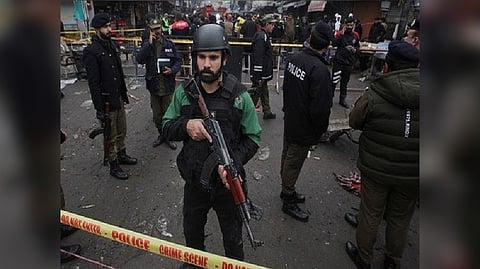

ISLAMABAD [PAKISTAN]: After the fall of Ashraf Ghani's government in Afghanistan, Pakistan was one of the few countries to applaud the Taliban takeover of the war-ravaged country while hoping to reap benefits from what it regarded as a strategic victory.
However, the increased militancy in Pakistan and border clashes with the Taliban that have happened since August last year have indicated otherwise, according to columnist Ali Ahmad.
In his Afghan Diaspora Network report, Ahmad argued that the "strategic depth policy" of Pakistan has now turned into a "strategic menace." Pakistan has historically followed a "Strategic Depth Policy" towards Afghanistan, whereby it attempts to control the country as a political pawn and strategic hedge vis-a-vis India.
When the democratic government was ousted in August 2021, the then-Pakistan Intelligence Chief went there in Kabul to celebrate this takeover.
"Pakistan, being supported Taliban with arms, ammunition and safe haven during their 20-year insurgency against the West and the Afghan government, believed that it was time for Taliban to reciprocate," said Ahmad.
The US exit from Afghanistan had bolstered Tehrik-i-Taliban Pakistan (TTP) activities with its base in the war-torn country still intact, Pakistan's counter-terrorism authority in Islamabad told the country's Senate Standing Committee on Interior earlier this month.
The TTP gained considerable ground and increased its footprint and magnitude of activities during the peace talks process, The News International newspaper reported. Last month, the TTP formally withdrew its ceasefire agreement with Pakistan, which was formally declared in June.
The withdrawal of the ceasefire agreement on November 28 was followed by a wave of terror attacks in Khyber Pakhtunkhwa and Balochistan.
Since August 2021, incidents of border skirmishes between Pakistan and Taliban-led Afghanistan have increased significantly.
"The latest border clash between the two countries in December 2022 had Taliban fighters and the Pakistani forces exchanging heavy artillery fires on each other in the Spin-Boldak-Chaman border," said Ali Ahmad. This cross-border firing killed reportedly many civilians on the Pakistani side and one Taliban fighter in Afghanistan.
Ahmad argued that these incidents show that the Taliban is not ready to accept Durand Line and would challenge Pakistan to ensure the sanctity of their sovereignty.
"Pakistan's desire to have a smooth ride on this issue remains a distant dream and Taliban appears to have woken up to the real intentions of Pakistan," he added.
Visit news.dtnext.in to explore our interactive epaper!
Download the DT Next app for more exciting features!
Click here for iOS
Click here for Android